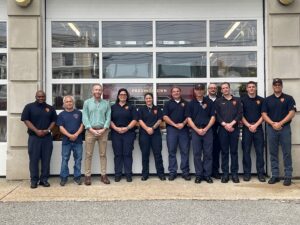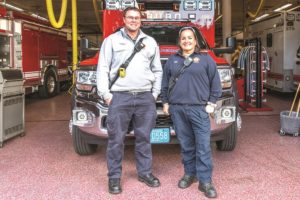Staffing up is the focus as the complex transition from the 86-year-old Lower Cape Ambulance Association to in-house emergency medical services in Provincetown and Truro gets underway.

At the end of June, Provincetown announced, with some fanfare, that it had hired all eight of the emergency responder positions that town meeting voters had approved in April. Three of those employees are firefighter-EMTs and five are firefighter-paramedics, the more advanced qualification; their start date with the town was July 1.
Truro, too, has been quietly staffing up in the past few months after more than a year of slow-going. Three of eight open positions have been filled since March, with two or three more candidates from a pool of four finalists likely receiving offers in the coming week, according to Town Manager Darrin Tangeman.
Truro approved four new firefighter-paramedic positions at the April 2022 town meeting but could not hire anyone until the new year. Another four positions were approved at the last town meeting.
The personnel across the two towns are arriving with dramatically different levels of EMS experience on this sandbar. In Provincetown, six of the eight new hires were former LCAA employees, Fire Chief Mike Trovato said.
In Truro, none of the three new hires came from LCAA. Truro officials have interviewed 11 new applicants over the past few weeks, and only one was from LCAA, Tangeman said.
The town is also contracting with a traveling paramedic company based in Bozeman, Mont. to bring in two new medics on six-month contracts, according to Truro Fire Chief Tim Collins. “What this allows us to do is have advanced life support coverage while gearing up our existing staff,” he said.
At an office hours chat open to town residents on Monday, Tangeman said that Truro is “ahead of schedule in terms of recruitment and hiring.” Still, he said, they’re “competing for the same people that Provincetown is” to fill these paramedic roles.
Provincetown received 54 applications in five months for the eight positions; 12 of those applicants were LCAA employees when they applied, according to Assistant Town Manager Dan Riviello.
In January, former LCAA medic and new Provincetown employee Patrick O’Neil told the Independent he thought that no LCAA staff had applied for the first four Truro jobs because “the department does not have a good reputation.” In response, Truro Fire Chief Tim Collins said, “Everyone is entitled to their own opinion.”
“We had to go through a more deliberate process for compensation analysis, and we were going through extended collective bargaining negotiations that didn’t conclude until after Provincetown had already started their recruitment,” Tangeman told the Independent. The negotiations wrapped up in June, he said.
“Once that agreement was reached, we moved forward aggressively to advertise and hire,” Collins said.
“We are now very competitive,” Tangeman added.
The latest postings in Truro advertised a union position with benefits, an hourly salary range of $35.31 to $46.08, and a $3,000 signing bonus.
This hiring spree was precipitated by a flurry of winter negotiations between Provincetown, Truro, and Lower Cape Ambulance. Historically, Lower Cape ran transports to Cape Cod Hospital in Hyannis and collected ambulance payments from insurance, relieving the town’s volunteer emergency responders of making the trip.
But the towns have wanted to move away from the LCAA contract for a few years; in 2022, Truro commissioned a report that outlined Lower Cape’s failure to meet its staffing obligations of having four medics in Provincetown and two in Truro.
At one point, it looked like Lower Cape would have to cease operations by July 1, forcing the towns to staff up in a serious crunch. But renewed communication efforts as well as concerns expressed by Lower Cape’s own employees, who were not certified as firefighters, halted the plan.
The transition is now expected to take up to three years, and the towns and Lower Cape are renewing an 18-month contract sometime in August with the possibility of a one-year extension in 2025.
After six of its 16 full-time employees took jobs in Provincetown, LCAA is now facing a staffing shortage. Six departures “was a little more than we expected,” Lower Cape COO Steven Roderick said. Lower Cape is actively hiring to meet its ongoing staffing obligations, which are two ambulance crews in Provincetown and one in Truro, through the transition.
“The idea is they ramp up, we ramp down,” Roderick said. “But we have to agree when those numbers change, and I don’t think we’ve mapped that out between the two towns.”
In addition to the eight new full-time employees, Provincetown has also brought on an EMS coordinator, Othaine Rance. But according to Trovato, these hires haven’t moved the needle on the actual number of emergency responders in town, since LCAA employees have constituted the seasonal rescue squad in the past. “We’ll basically have summer standby year-round,” he said.
Part of the problem is that Provincetown, Truro, and Lower Cape have all been working with one limited pool of qualified medics and EMTs. “We’ve been pulling the same people to do all these tasks,” said Trovato. “We were lucky to grab two people that weren’t affiliated with any other department, and hopefully we can keep them here.” One is commuting from Centerville and the other from the Barnstable area, Trovato said.
Although Truro has yet to hire any former LCAA employees, it will have pulled at least seven new firefighter-EMTs and firefighter-paramedics into that pool.
The two chiefs have differing visions of how the firefighting side of the equation should be handled going forward.
Trovato is more disappointed with how the transition played out; he wanted two in-house divisions, Provincetown Fire and Provincetown EMS, the latter essentially taking over Lower Cape’s role. The town’s call firefighter network is “incredible” and functional, Trovato said. At the recent Coffey Men store fire at 173 Commercial St., “within 10 minutes, I probably had 40 call guys there,” he said, and despite a sprinkler system malfunction, they were able to contain the fire to the “store of origin.”
Collins, on the other hand, said that call firefighters can’t be a “silver bullet” for Truro. In fact, most of them have died or moved away. “Doubling the size of your fire department is a good thing,” he said. Though people more readily focus on the ambulance services, he said.
“I understand that,” Collins said. “But we have a very robust mutual aid situation on Cape Cod. Our geographic location makes it more of a challenge.
“At the end of the day,” he said, when people call, “we’re coming.”

